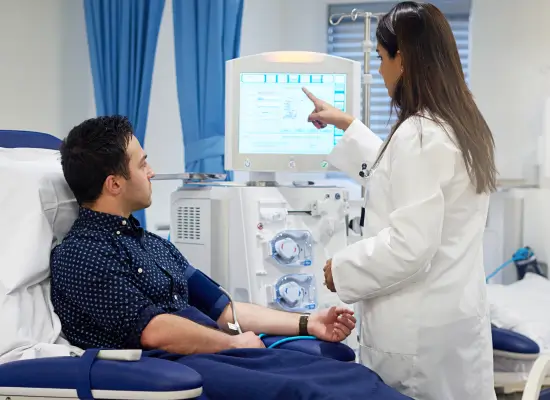In general, it is expected to live from 10 to 20 years for a person on dialysis.

Synopsis
Dialysis serves as a beacon of hope for those battling kidney failure, providing them a second chance to live life to the fullest. This article will explore everything you may need to know about this revolutionary medical evaluation before opting for it, from what procedure you may expect to which healthcare institution you may choose, particularly if you're living in Bangalore.
Introduction
The kidney is a crucial organ of the human body, which not only excretes waste body products but also regulates body temperature. Failure of this important body organ can affect overall health conditions, which include a harmful buildup of toxins due to the excess waste products escaping into the bloodstream. Dialysis is a procedure that helps clean these toxins with an artificial set-up of the kidney. Considering the importance of the procedure, it is crucial to choose from one of the best dialysis centres in Bangalore, a centre equipped with modern tools and surgical equipment, with the expertise of the best nephrologist. This is where Gleneagles Hospital Step Up - one of the premier dialysis hospitals in Bangalore, for a variety of health issues with the highest success rate across India.
What is Dialysis?
Dialysis is a therapy focused on clearing waste products, toxins, and excess fluid from the blood when the kidneys can no longer do so. The kidneys, under normal circumstances, filter blood, eliminate waste, and maintain fluid balance. When kidney function declines to a critical point, dialysis comes in to assume these essential functions. The process prevents toxic accumulation in the body, maintaining the organs in their best working condition. Simply put, Dialysis replicates the natural filtration activity of the kidneys so that the body is balanced.

Why Choose Dialysis in Bangalore?
Dialysis is a treatment procedure for patients dealing with end-stage renal disease or kidney failure. Selecting this treatment procedure can be a life-changing option in an individual's life with numerous advantages related to the procedure, which are:
- Maintenance of Electrolyte Balance: Kidney failure leads to an imbalance of electrolytes like potassium, sodium, and calcium, which are required for the proper functioning of the body. Dialysis helps maintain the right balance of these electrolytes, avoiding problems like muscle cramps, arrhythmias of the heart, and bone diseases.
- Prevention of Complications: In the absence of dialysis, kidney failure may cause serious complications, such as cardiovascular issues, nerve damage, and even death. Dialysis prevents these risks from occurring by preserving basic body functions until a kidney transplant or additional treatments can be done.
- Enhanced Quality of Life: Dialysis, as much as it is a routine treatment, ensures that patients with kidney failure live relatively active lives by relieving symptoms of kidney disease, including fatigue, weakness, and swelling. It brings stability, enabling patients to live relatively independently while controlling their disease.
- Assistance to Transplant Candidates: For individuals who are on the waiting list for a kidney transplant, dialysis functions as a bridge to sustain them alive and healthy while they wait for a suitable donor organ. It stabilises their health so that they can receive a transplant with optimal results.
- Tailored Treatment Options: Dialysis may be adapted to a patient's requirements, providing flexibility for how frequently treatment takes place. Either through haemodialysis within a clinic setting or peritoneal dialysis in the patient's home environment, patients can select the appropriate method of treatment to fit into their lifestyle.
Your health matters – get expert advice today.
Types of Dialysis
Dialysis is divided into two main types based on the approach it uses for filtration and the specific needs of a particular patient and his/her lifestyle. Here is a list of these types and the algorithm it follows before and during the process:
Haemodialysis: It is the most commonly used type of Dialysis in Bangalore and other parts of the world. The procedure includes drawing blood from the body and passing it through a dialyser, also called an artificial kidney, and then returning it to the body. The whole process is typically 3 to 5 hours and is done three times a week.
What You can Expect Before the Procedure
Before the actual procedure of haemodialysis starts, patients need to undergo minor surgery to create the opening points to access the blood flow. This surgery generally involves temporarily fitting an arteriovenous fistula or arteriovenous graft in the arm or placing a catheter into the veins for immediate access.
Procedure It Involves:
In Haemodialysis, the blood is removed from the body via a needle and passes through a filter, which eventually removes toxins and other harmful fluids from the body. After filtering the impure blood, the cleaned blood returns to the body. Note that the procedure is done in a haemodialysis centre under the surveillance of healthcare providers and advanced tools.
Peritoneal Dialysis: Peritoneal dialysis operates by using the peritoneum (the lining of the abdomen) as a natural filter. The process involves inserting a catheter into the belly, through which a cleansing solution is infused into the peritoneal cavity. The solution collects waste and excess fluids from the abdominal blood vessels and is then removed from the body after several hours.
What Can You Expect Before the Procedure?
Before performing the peritoneal dialysis, patients are required to undergo a small surgical process in which a surgeon will insert a catheter into the abdomen. The catheter is placed into the peritoneal cavity under the abdominal wall, which allows the solution used in the procedure to flow actively in and out of the body without any hindrance. This step is done almost 2 to 3 weeks before the start of peritoneal dialysis, giving the site of insertion the required time it needs to heal.
Procedure It Involves:
The procedure is usually done at the ease of your home, which is either done manually - Continuous Ambulatory Peritoneal Dialysis or CAPD, or with the help of a machine, which is also known as Automated Peritoneal Dialysis or APD, eventually allowing the patient more flexibility in managing their condition.
Restrictions for Someone on Dialysis
Dialysis comes with its own set of restrictions for someone who is on it. If you or your loved one is on dialysis and decide to shift to a new location, inform your healthcare provider so that they may help you arrange a dialysis centre at the new place. Or if you are travelling, then make sure to bring with you dialysis solution bags or easy-to-carry dialysis machines.
A person who is on peritoneal dialysis needs to stop or limit certain exercises when the abdomen is filled with solution. For detailed information on what exercises you may perform, ask your healthcare provider.
Dialysis Cost in Bangalore
The dialysis cost in Bangalore generally depends on various factors such as the choice of the procedure, the overall health of the patient, whether he/she needs an additional procedure and the clinical expertise of a nephrologist or the reputation of a hospital. The Cost of Dialysis typically lies anywhere between INR 750 to INR 5000 per cycle.
Risks & Complications
Although a life-saving procedure, Dialysis can come up with certain health-related risks and complications that need to be treated with proper care to avoid any serious health issues, which include:
- Infections: Infections are most common in peritoneal dialysis near the site of catheter incision or in the abdomen. However, Haemodialysis patients also have equal chances of getting infected.
- Low Blood Pressure: There may be a lowering of blood pressure by haemodialysis, causing dizziness, nausea, and fainting.
- Muscle Cramps: Muscle cramps are experienced by some patients on or following dialysis, especially during haemodialysis.
- Hernias (with peritoneal dialysis): Insertion of the catheter and inflation with fluid can put pressure on the muscles of the abdomen, which can cause a hernia to form in certain instances.
- The above-mentioned risks and complications associated with dialysis can be prevented by choosing some of the best kidney dialysis centres in Bangalore based on their expertise and success rates.
Why Choose Gleneagles Hospital for Dialysis in Bangalore?
Gleneagles Hospital is one of the best dialysis centres in Bangalore and across India for nephrology and other branches of medicine. The hospital has been a pioneer in developing innovative and revolutionary treatment procedures. Here are some reasons why choosing the hospital can be a game-changer for you or your loved ones:
- Expert care and Personalised treatment plans suited for the needs of a patient.
- Highly Skilled and experienced doctors and surgeons work together to give the best possible outcome.
- Advanced and modern dialysis centre with proper sanitation to avoid infections.
- High success rates in successful kidney transplants.
Our Doctors
View allDr Rajiv E N
Consultant - Nephrologist and Transplant Physician
MBBS, MD (Gen Medicine), DM (Nephrology)
Dr Anil Kumar B T
HOD and Sr Consultant - Nephrologist and Transplant Physician
MBBS, MD (General Medicine), DNB (Nephrology)
Dr Arun Kumar J
Consultant - Nephrologist
MBBS, MD (Gen Medicine), DNB (Gen Medicine), DNB (Nephrology)
Frequently Asked Questions
The dialysis cost in Bangalore can range from as low as Rs 750 to as high as Rs 5000.
Look for high skills, success rates, the expertise of doctors, and genuine reviews from previous patients to locate good dialysis hospitals in Bangalore.
Low blood pressure, hernia, infections, and muscle cramps are some of the common risks connected with dialysis in Bangalore.
Due to its patient-centric approach, assistance for further treatments like kidney transplants, and friendly environment, Gleneagles is one of the best dialysis centres in Bangalore.


















